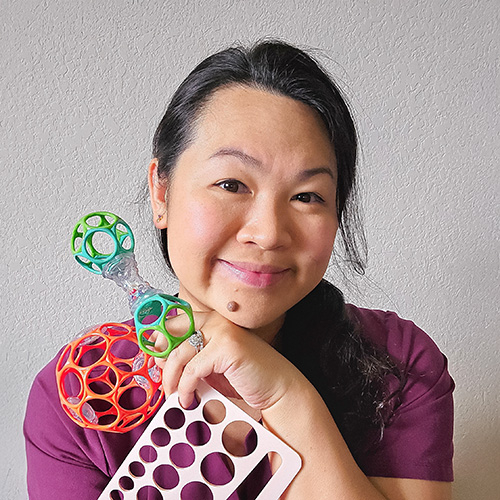 Presentation Information
Presentation Information
How Motor Patterns, Sensory Processing, and Newborn Reflexes Impact Breastfeeding
- Speaker: Stephanie Wong , MOT, OTR/L, CNT, IBCLC, NTMTC
- Presentation Type:
- Duration: 540 Mins
- Credits:
Abstract:
Breastfeeding is a dynamic process shaped not only by maternal factors but also by the infant’s reflexes, motor patterns, and sensory processing. This presentation explores how infants’ neurological, sensory, and motor development influence latch, milk transfer, and feeding comfort. Participants will gain an evidence-based understanding of the suck–swallow–breathe triad and primitive reflexes as well as the role of sensory organization in breastfeeding success. Practical applications will highlight how to observe infant body cues, identify barriers such as motor fatigue or sensory sensitivities, and implement positioning and environmental strategies to support more effective and stress-free feeding.
This session bridges research and practice by emphasizing how body-led approaches can optimize feeding outcomes and parental confidence. By the end of the session, attendees will be able to assess motor and sensory readiness for feeding, apply responsive positioning techniques, and integrate these principles into individualized care plans. This presentation supports a deeper understanding of the infant’s body as an active driver of breastfeeding success, equipping professionals with strategies to promote healthier, more sustainable feeding experiences.
Live Presentation Schedule
Mar 27, 2026
-
 Create a Reminder
27-03-2026 08:00
27-03-2026 17:00
35
How Motor Patterns, Sensory Processing, and Newborn Reflexes Impact Breastfeeding
Breastfeeding is a dynamic process shaped not only by maternal factors but also by the infant’s reflexes, motor patterns, and sensory processing. This presentation explores how infants’ neurological, sensory, and motor development influence latch, milk transfer, and feeding comfort. Participants will gain an evidence-based understanding of the suck–swallow–breathe triad and primitive reflexes as well as the role of sensory organization in breastfeeding success. Practical applications will highlight how to observe infant body cues, identify barriers such as motor fatigue or sensory sensitivities, and implement positioning and environmental strategies to support more effective and stress-free feeding.
This session bridges research and practice by emphasizing how body-led approaches can optimize feeding outcomes and parental confidence. By the end of the session, attendees will be able to assess motor and sensory readiness for feeding, apply responsive positioning techniques, and integrate these principles into individualized care plans. This presentation supports a deeper understanding of the infant’s body as an active driver of breastfeeding success, equipping professionals with strategies to promote healthier, more sustainable feeding experiences.
GOLD Lactation Conference
false
DD/MM/YYYY
Create a Reminder
27-03-2026 08:00
27-03-2026 17:00
35
How Motor Patterns, Sensory Processing, and Newborn Reflexes Impact Breastfeeding
Breastfeeding is a dynamic process shaped not only by maternal factors but also by the infant’s reflexes, motor patterns, and sensory processing. This presentation explores how infants’ neurological, sensory, and motor development influence latch, milk transfer, and feeding comfort. Participants will gain an evidence-based understanding of the suck–swallow–breathe triad and primitive reflexes as well as the role of sensory organization in breastfeeding success. Practical applications will highlight how to observe infant body cues, identify barriers such as motor fatigue or sensory sensitivities, and implement positioning and environmental strategies to support more effective and stress-free feeding.
This session bridges research and practice by emphasizing how body-led approaches can optimize feeding outcomes and parental confidence. By the end of the session, attendees will be able to assess motor and sensory readiness for feeding, apply responsive positioning techniques, and integrate these principles into individualized care plans. This presentation supports a deeper understanding of the infant’s body as an active driver of breastfeeding success, equipping professionals with strategies to promote healthier, more sustainable feeding experiences.
GOLD Lactation Conference
false
DD/MM/YYYY
-
 Tell a Friend
Tell a Friend



